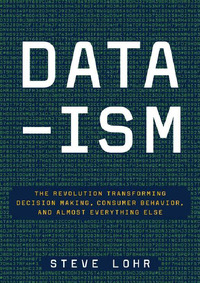Data-IsmThe Revolution Transforming Decision Making, Consumer Behavior, and Almost Everything Else
|

|
 Diese Seite wurde seit 2 Jahren inhaltlich nicht mehr aktualisiert.
Unter Umständen ist sie nicht mehr aktuell.
Diese Seite wurde seit 2 Jahren inhaltlich nicht mehr aktualisiert.
Unter Umständen ist sie nicht mehr aktuell.
 Zusammenfassungen
Zusammenfassungen
 Steve Lohr, a technology reporter for the New York Times, chronicles the rise of Big Data, addressing cutting-edge business strategies and examining the dark side of a data-driven world.
Steve Lohr, a technology reporter for the New York Times, chronicles the rise of Big Data, addressing cutting-edge business strategies and examining the dark side of a data-driven world.
Coal, iron ore, and oil were the key productive assets that fueled the Industrial Revolution. Today, Data is the vital raw material of the information economy. The explosive abundance of this digital asset, more than doubling every two years, is creating a new world of opportunity and challenge.
Data-ism is about this next phase, in which vast, Internet-scale data sets are used for discovery and prediction in virtually every field. It is a journey across this emerging world with people, illuminating narrative examples, and insights. It shows that, if exploited, this new revolution will change the way decisions are made—relying more on data and analysis, and less on intuition and experience—and transform the nature of leadership and management.
Lohr explains how individuals and institutions will need to exploit, protect, and manage their data to stay competitive in the coming years. Filled with rich examples and anecdotes of the various ways in which the rise of Big Data is affecting everyday life it raises provocative questions about policy and practice that have wide implications for all of our lives.
 Dieses Buch erwähnt ...
Dieses Buch erwähnt ...
 Dieses Buch erwähnt vermutlich nicht ...
Dieses Buch erwähnt vermutlich nicht ... 
 Nicht erwähnte Begriffe | amazon, Datenschutz, facebook, Fremdsprache, Fremdsprachenlernen, Schule, Tablet |
 Tagcloud
Tagcloud
 Zitationsgraph
Zitationsgraph
 Zitationsgraph (Beta-Test mit vis.js)
Zitationsgraph (Beta-Test mit vis.js)
 Volltext dieses Dokuments
Volltext dieses Dokuments
 Bibliographisches
Bibliographisches 
 Beat und dieses Buch
Beat und dieses Buch
Beat hat dieses Buch während seiner Zeit am Institut für Medien und Schule (IMS) ins Biblionetz aufgenommen. Beat besitzt kein physisches, aber ein digitales Exemplar. (das er aber aus Urheberrechtsgründen nicht einfach weitergeben darf). Es gibt bisher nur wenige Objekte im Biblionetz, die dieses Werk zitieren.











 Algorithmus
Algorithmus Apple
Apple big data
big data cloud computing
cloud computing Computer
Computer Daten
Daten Digitalisierung
Digitalisierung E-Mail
E-Mail Google
Google IBM
IBM Internet
Internet iPad
iPad Künstliche Intelligenz (KI / AI)
Künstliche Intelligenz (KI / AI) machine learning
machine learning Microsoft
Microsoft Privatsphäre
Privatsphäre Produktivität
Produktivität Sprache
Sprache Statistik
Statistik work-life-balance
work-life-balance







 , 1075 kByte)
, 1075 kByte) 

 Biblionetz-History
Biblionetz-History